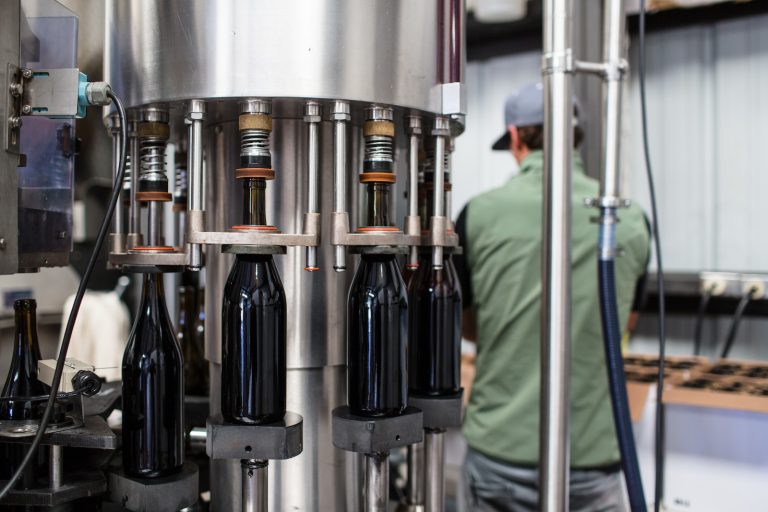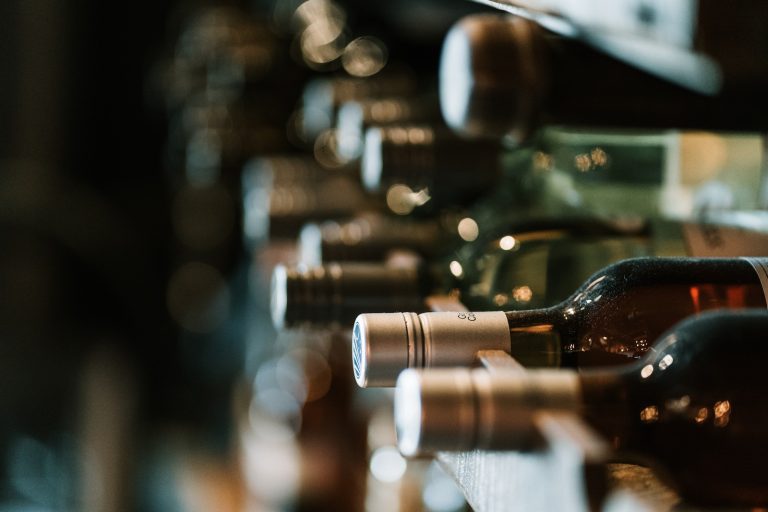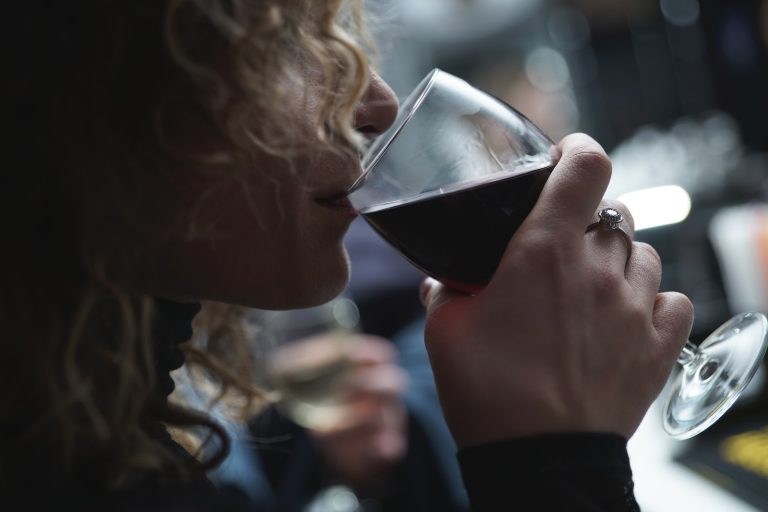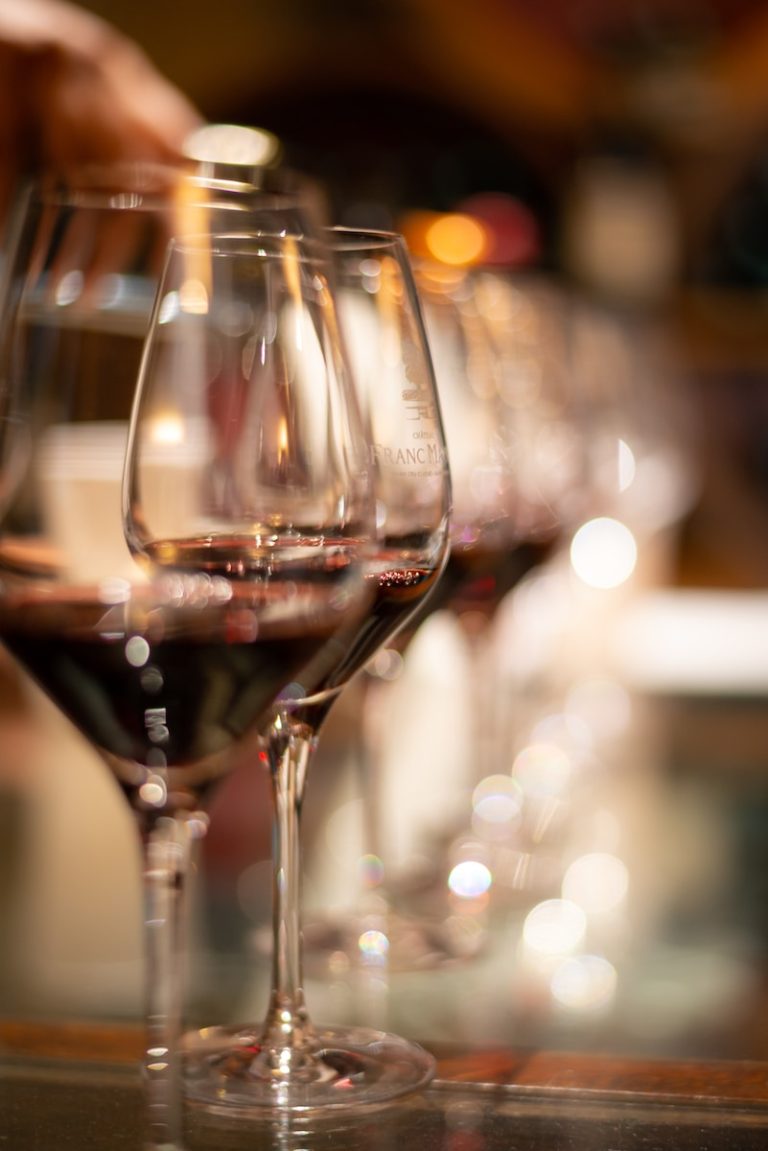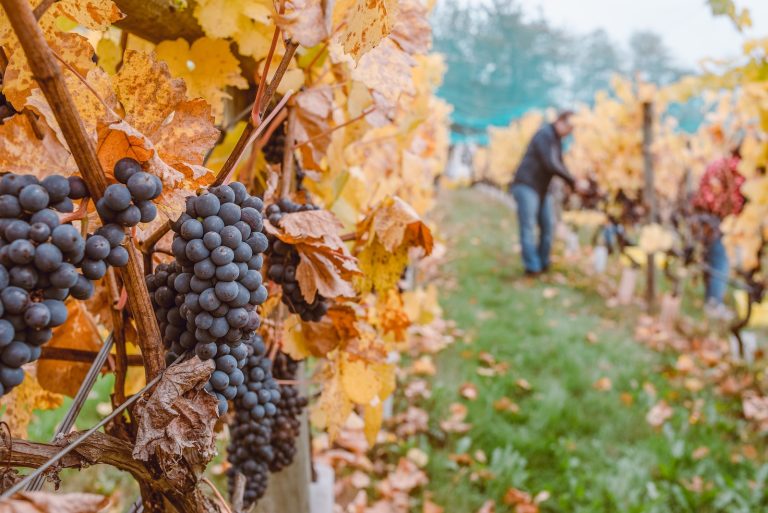Wine Aficionado vs Wine Connoisseur: What’s the Difference
Table of Contents
There are so many terms thrown around In the business of wine, we as wine enthusiasts often encounter. Among these terms, “wine aficionado” and “wine connoisseur” frequently come up in conversation. While both terms suggest someone who appreciates good and different types of wine, they actually represent different levels of expertise and engagement in the wine culture.
In this guide, we’ll explore the differences between these two “wine appreciation levels”. We’ll look at how aficionados and connoisseurs (and sommeliers) approach wine tasting, what knowledge they typically possess, and how they engage with the broader wine community.
Whether you’re just starting your wine journey or looking to deepen your expertise, understanding these distinctions can help you navigate the wine world more confidently. You’ll basically be able to talk wine with anyone, anywhere.
Before we get into the specifics, it’s important to note that neither term is inherently “better” than the other. Instead, they represent different points along the wine appreciation spectrum, each with its own valuable perspective on enjoying and understanding wine.
What’s a Wine Aficionado?
When we talk about wine aficionados, we’re describing enthusiastic wine lovers who actively pursue their interest in wine. These passionate hobbyists typically have a solid foundation of wine knowledge that goes beyond casual appreciation. Let’s explore what sets them apart.
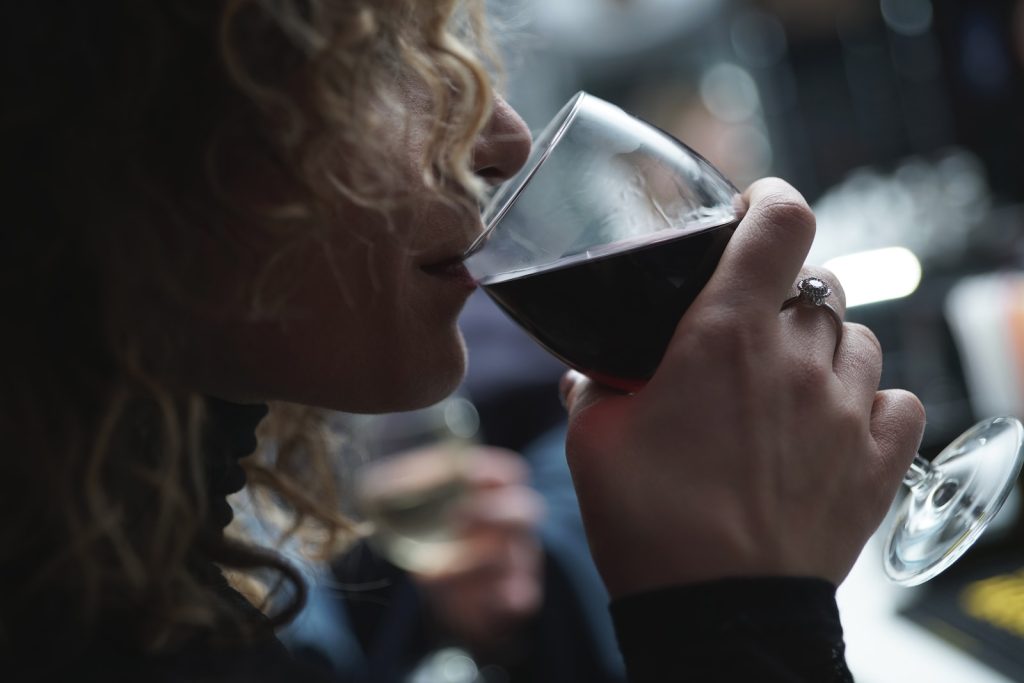
Knowledge and Approach
Wine aficionados develop their expertise through a combination of structured learning and hands-on experience. While they may not know the deepest technical aspects of winemaking or have pristine formal training, they cultivate a practical understanding that enhances their appreciation and enjoyment. Their knowledge tends to be broad rather than specialized, allowing them to engage confidently with wines from various regions and styles. This practical knowledge base helps them make informed choices about wine purchases and food pairings.
Wine aficionados usually have
- A broad understanding of major wine regions, from Napa Valley to Bordeaux
- Familiarity with common grape varieties and their characteristics
- Basic knowledge of wine tasting terminology and different regions
- Understanding of best practices in food and wine pairings
Tasting Experience
For aficionados, wine tasting is both a social activity and a learning opportunity. They develop their palates through regular exposure to different wines, often participating in organized tastings or hosting their own wine gatherings. While they might not employ the rigorous evaluation methods of professional tasters, they cultivate an appreciation for the nuances that make each wine unique. This experiential learning helps them build confidence in their preferences and ability to discuss wines meaningfully.
Aficionados approach wine tasting with enthusiasm and curiosity. They:
- Regularly attend wine tastings and events
- Know how to hold a glass of wine
- Keep track of their favorite wines and producers
- Recognize basic wine characteristics like tannins and acidity
- Share their discoveries with other wine enthusiasts
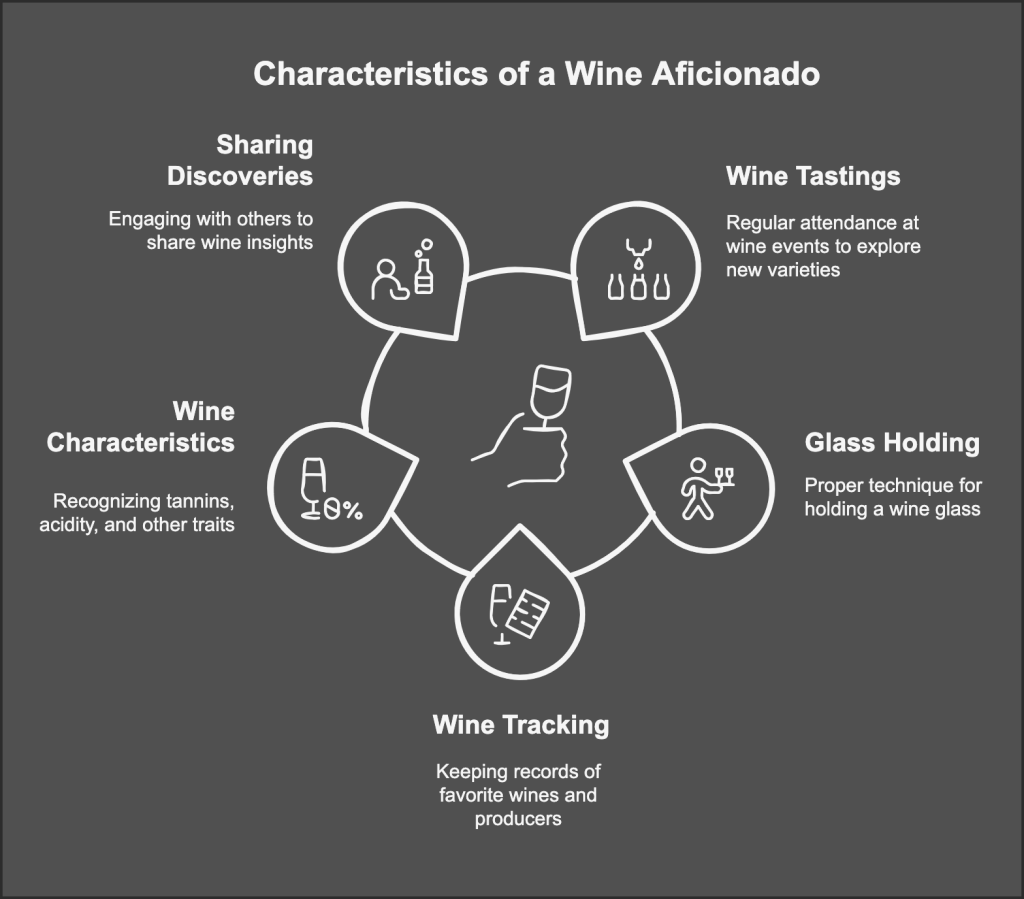
The Aficionado Learning Journey is Our Journey
The path to becoming a wine aficionado typically unfolds organically through a combination of personal interest and social connections. Rather than following a formal curriculum, aficionados tend to learn through experience and exploration, guided by their curiosity and supported by the wider wine community. This natural progression allows them to develop their knowledge at their own pace while building meaningful connections with fellow wine enthusiasts.
Most aficionados develop their knowledge through
- Wine tasting events and local wine clubs
- Reading wine blogs and magazines
- Following wine critics, wine experts and influencers
- Visiting wineries during travel
Wine Connoisseur Profile
The term “wine connoisseur” represents a deeper level of wine expertise that goes beyond enthusiastic appreciation. These individuals have typically invested significant time and resources into developing their wine knowledge through formal education, professional experience, or both. Their approach to wine combines passion with precision, backed by technical understanding and refined tasting abilities. The connoisseur either is, or is closer to, a certified sommelier.
Technical Knowledge
Wine connoisseurs possess a sophisticated understanding of viticulture and vinification that shapes their appreciation of wine. They can explain not just what they taste, but why those characteristics exist in the wine. This deep technical knowledge allows them to assess wines objectively and understand how various factors influence wine quality.
Wine connoisseurs typically master
- Detailed understanding of winemaking techniques and their impact on wine style
- Comprehensive knowledge of world wine regions and their regulations
- Expert-level understanding of grape varieties and their expressions in different terroirs
- Advanced chemistry of wine and fermentation processes
- Historical context of wine regions and producers
Tasting Methodology
For connoisseurs, wine tasting is a systematic process that combines sensory analysis with technical evaluation. They approach each wine with an analytical mindset, drawing on their extensive knowledge to assess quality and authenticity. This methodical approach allows them to make objective assessments while still appreciating the artistry of winemaking.
Wine connoisseurs tasting approach includes
- Systematic evaluation using professional tasting frameworks
- Ability to identify subtle flaws and wine faults
- Advanced blind tasting skills
- Detailed assessment of aging potential
- Understanding of vintage variations and their impact
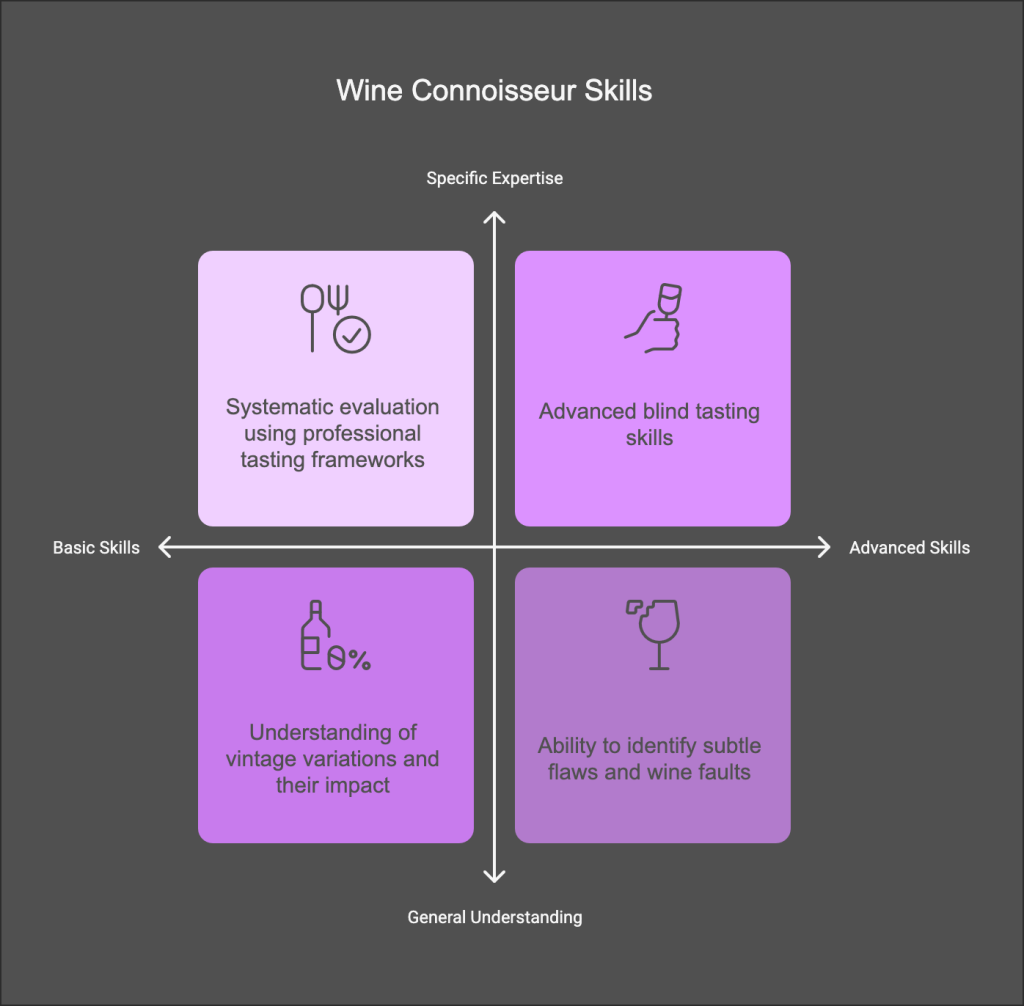
Professional Engagement
Wine connoisseurs often engage with wine at a professional level, whether through direct employment in the industry or serious academic pursuit. Their expertise typically extends beyond personal appreciation into areas that contribute to the wider wine community’s knowledge and understanding.
Their professional involvement often includes
- Participation in wine judging and evaluation panels
- Contribution to wine publications and research
- Consulting for wine producers or retailers
- Teaching wine education courses
- Building and managing significant wine collections
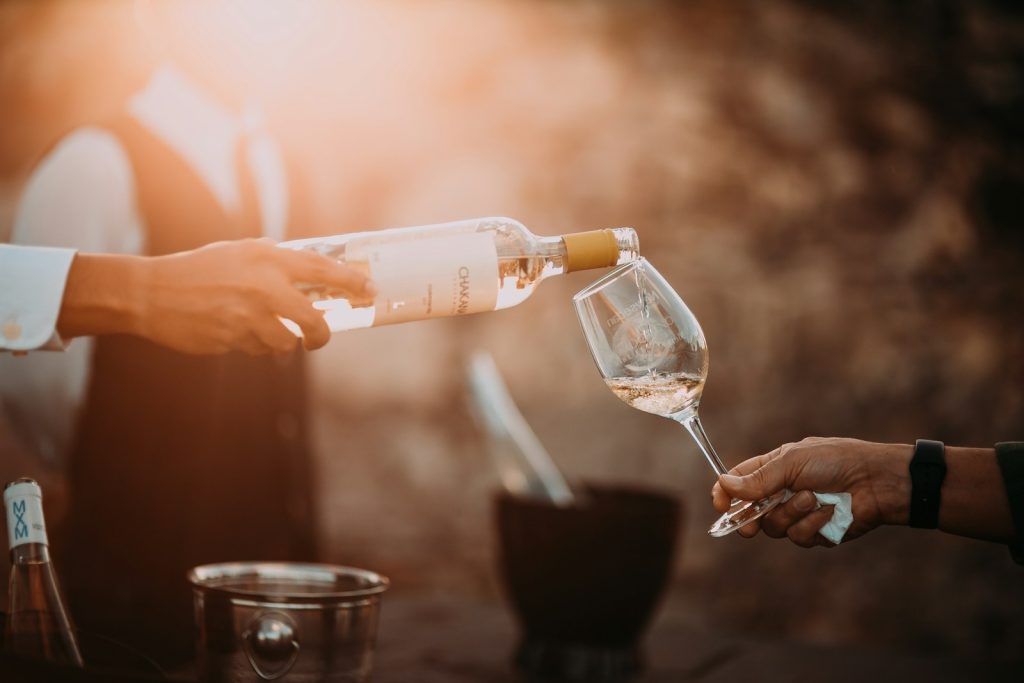
Main Differences Between Aficionados and Connoisseurs
While both aficionados and connoisseurs share a passion for wine, their approaches and levels of engagement differ significantly. Understanding these distinctions helps us appreciate the unique value each brings to the wine community. Let’s explore the key areas where these differences become most apparent.
Depth of Knowledge
The most fundamental difference lies in the depth and specificity of wine knowledge. While aficionados cultivate a broad, practical understanding, connoisseurs develop specialized expertise that includes technical and scientific aspects of wine production. We can think of it as the difference between knowing that a wine tastes good and understanding precisely why it tastes the way it does.
Key distinctions in knowledge include
- Technical Understanding
- Aficionados grasp basic wine terminology, while connoisseurs understand complex chemical processes
- Regional Expertise
- Aficionados know major wine regions, while connoisseurs comprehend specific sub-regions and microclimates
- Historical Context
- Aficionados appreciate famous vintages, while connoisseurs understand how historical events shaped wine styles
- Production Methods
- Aficionados recognize common winemaking terms, while connoisseurs understand intricate production decisions
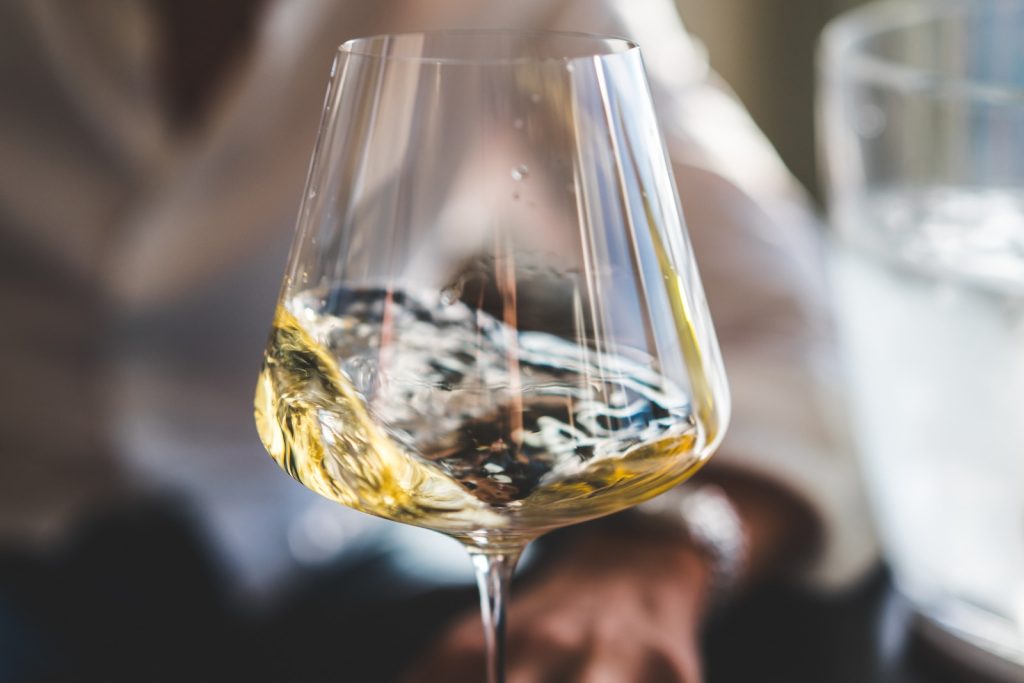
Approach to Wine Evaluation
The way each group evaluates wine reveals another significant difference. Aficionados and connoisseurs often look for different things when tasting wine, approaching the experience with distinct goals and methodologies.
Contrasting evaluation styles
- Tasting Method
- Aficionados focus on enjoyment and general characteristics, while connoisseurs employ systematic analysis
- Quality Assessment
- Aficionados identify what they like, while connoisseurs evaluate technical merit and typicity
- Note-Taking
- Aficionados keep casual tasting notes, while connoisseurs document detailed technical observations
- Comparative Analysis
- Aficionados enjoy comparing different wines, while connoisseurs conduct structured comparative tastings
Investment and Commitment
The level of investment in wine education, collection, and professional development also differs markedly between these two groups. This investment isn’t just financial, it encompasses time, energy, and career focus as well.
Notable differences in commitment
- Education
- Aficionados attend tastings and classes, while connoisseurs pursue formal certifications
- Collection Focus
- Aficionados collect wines they enjoy, while connoisseurs build strategic collections
- Time Investment
- Aficionados dedicate hobby time, while connoisseurs often make wine a career focus
- Financial Commitment
- Aficionados budget for good wines, while connoisseurs invest in rare and age-worthy bottles
The Wine Professional World
The world of wine professionals extends beyond connoisseurs to include various specialized roles. Understanding these distinctions helps us appreciate the different ways expertise manifests in the wine industry. Let’s explore how connoisseurs fit into the broader landscape of wine professionals, particularly in relation to sommeliers and other industry experts.
Connoisseurs in the Professional Context
While not all connoisseurs work in the wine industry, their expertise often positions them uniquely within the professional wine world. Their deep knowledge can be applied across various aspects of the industry, from education to consultation.
Professional contributions often include
- Writing detailed wine reviews and analysis
- Consulting on wine list development
- Advising private collectors and investors
- Contributing to wine education programs
- Judging at wine competitions
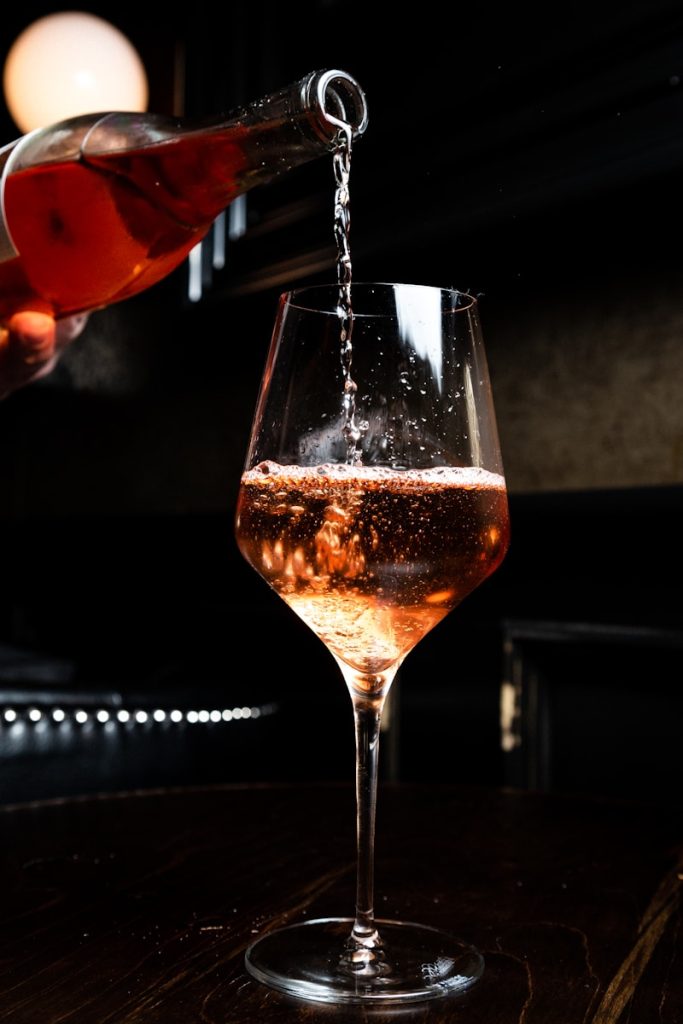
The Sommelier’s Role
Sommeliers represent a specific professional path that combines wine expertise with hospitality service. While there’s often overlap with connoisseurs in terms of knowledge, sommeliers focus on different aspects of wine appreciation and service.
Key aspects of sommelier work
- Creating and managing restaurant wine programs
- Providing table side service and recommendations
- Training service staff on wine knowledge
- Managing wine inventory and storage
- Developing food and wine pairing programs
Professional Certifications and Education
The wine industry offers various paths to professional recognition, each with its own focus and requirements. These credentials help establish expertise and credibility within different aspects of the wine world.
Notable certification paths include
- Court of Master Sommeliers (CMS) certification levels
- Wine & Spirit Education Trust (WSET) qualifications
- Master of Wine (MW) program
- Certified Wine Educator (CWE) designation
- International Sommelier Guild (ISG) diplomas
Industry Roles and Specializations
The wine industry encompasses numerous specialized roles, each requiring different combinations of knowledge and skills. Understanding these various paths helps us appreciate the diverse ways wine expertise can be applied professionally.
Common professional specializations
- Wine buyers and importers
- Winery consultants and winemakers
- Wine educators and professors
- Critics and journalists
- Auction specialists and collection managers
Wine Aficionado vs Connoisseur vs Sommelier
When we discuss wine expertise, it’s important to understand how these three distinct roles differ in their approach, knowledge, and professional focus. While there can be overlap between them, each role serves a unique purpose in the wine world.
How They Enjoy Wine
Wine Aficionados
- Love discovering new wines during travels and local tastings
- Enjoy sharing wine experiences with friends and family
- Keep a collection of bottles that bring back good memories
- Love learning about wine regions they visit
- Often plan trips around wine destinations
Wine Connoisseurs
- Dive deep into the technical side of winemaking
- Build extensive knowledge about wine regions and producers
- Analyze wines in detail, often keeping detailed tasting notes
- Maintain carefully curated cellars
- Often mentor others in wine appreciation
Sommeliers
- Focus on helping others discover great wines
- Excel at matching wines with different foods
- Manage restaurant wine programs
- Guide diners through wine lists
- Create memorable wine experiences for guests
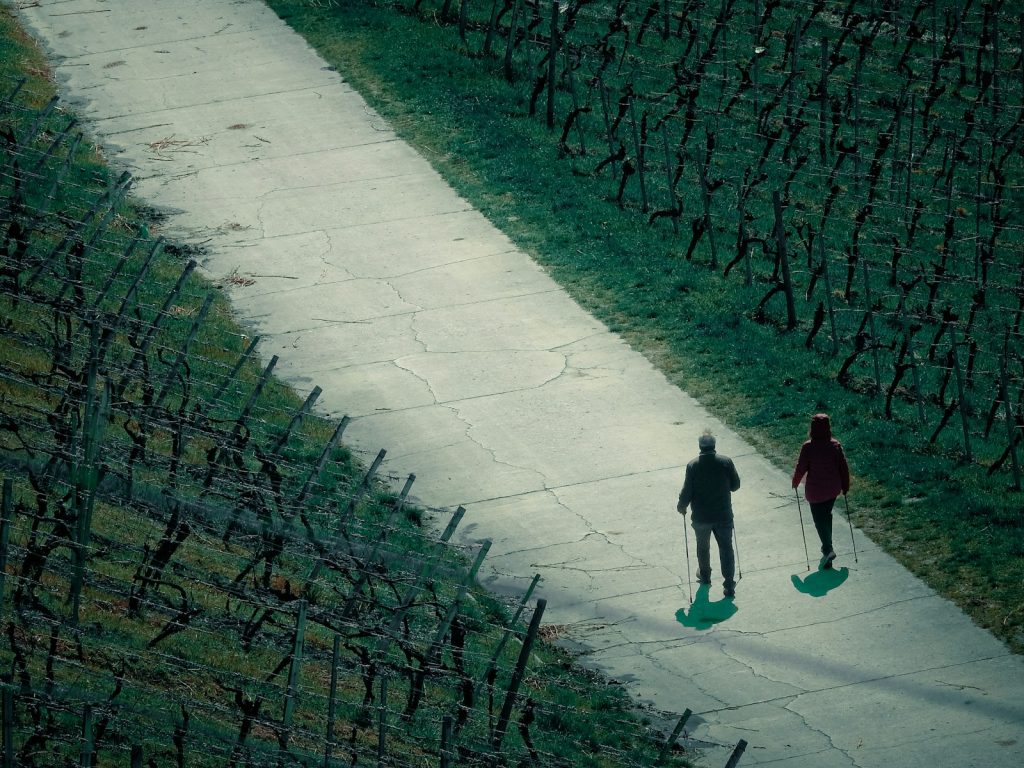
Educational Pathways
The journey to each role typically follows different educational tracks:
Wine Aficionados
- Self-directed learning through tastings and events
- Casual wine education courses
- Reading wine publications and blogs
- Learning through social wine experiences
Wine Connoisseurs
- Formal wine education programs
- Technical study of viticulture and vinification
- Extensive tasting experience
- Often pursue advanced certifications like Master of Wine
Sommeliers
- Court of Master Sommelier certification path
- Restaurant and hospitality training
- Service-focused wine education
- Specialized beverage management courses
Professional Context
Each role interacts with the wine industry differently:
Wine Aficionados
- Usually not professionally involved
- May participate in wine clubs or societies
- Focus on personal collection and enjoyment
- Often organize informal tastings
Wine Connoisseurs
- May work as critics or educators
- Often involved in wine judging
- Consulting for collectors or producers
- Writing and research in wine field
Sommeliers
- Restaurant and hospitality focus
- Wine list curation and staff training
- Direct customer service and education
- Beverage program management
How to Develop Wine Knowledge
Whether we aspire to be an aficionado or a connoisseur, developing wine knowledge is a rewarding journey that can be approached in many ways. The key is finding the right balance of learning methods that match our goals and interests. Let’s explore various paths to expanding our wine expertise.
Structured Learning Opportunities
Formal education provides a solid foundation for wine knowledge, offering structured approaches to understanding wine’s complexities. These opportunities range from casual classes to professional certification programs.
Educational options include
- Introductory wine appreciation courses
- Professional certification programs (WSET, CMS)
- Online wine education platforms
- Local wine school programs
- University-level viticulture and enology courses
Practical Experience
Hands-on experience forms a crucial part of wine education. Direct interaction with wines and industry professionals helps develop our palate and deepen our understanding of wine production and service.
Valuable practical experiences include
- Guided tastings and wine flights
- Winery tours and harvest experiences
- Wine fair and exhibition attendance
- Restaurant wine service training
- Home tasting practice sessions
Building Industry Connections
Networking within the wine community opens doors to learning opportunities and shared experiences. These connections can enhance our understanding and provide insights into different aspects of the wine world.
Ways to build connections
- Joining wine clubs and societies
- Attending industry events and conferences
- Participating in online wine communities
- Working with local wine shops and restaurants
- Engaging with wine professionals on social media
Personal Development Strategies
Creating a personalized approach to wine education helps ensure steady progress toward our goals. This involves combining various learning methods and experiences in a way that suits our individual preferences and objectives.
Effective development strategies
- Maintaining detailed tasting notes
- Building a reference library of wine resources
- Developing a systematic tasting methodology
- Creating personal wine study groups
- Setting specific learning milestones
The Value of Every Wine Journey
The distinction between wine aficionados and connoisseurs represents more than just different levels of expertise – it reflects the diverse ways we can engage with and appreciate wine. Whether we’re enthusiastic hobbyists or dedicated professionals, each approach adds value to the broader wine community.
Continuous Learning
The world of wine is constantly evolving, offering endless opportunities for discovery and growth. As we develop our knowledge and refine our palates, we find that every bottle presents a new learning opportunity. The journey from casual wine drinker to aficionado, or from aficionado to connoisseur, is unique for each person.
Community and Connection
Wine has always been about more than just what’s in the glass. It’s about sharing experiences, building connections, and celebrating together. Whether we’re attending casual tastings or formal wine education programs, the connections we make enhance our appreciation and understanding of wine.
Finding Your “Wine” Path
There’s no single “right way” to appreciate wine. Some of us will be content exploring wines casually as aficionados, like my husband and me, while others may feel drawn to pursue the deeper technical knowledge of a connoisseur. What matters most is finding the approach that best suits our interests and goals.
As we continue our wine journey, let’s remember that every level of wine appreciation contributes to the rich tapestry of wine culture. Whether we’re just beginning to explore wine or have spent years studying its intricacies, we’re all part of a community united by our appreciation for this extraordinary beverage.
Raise a glass to your next step in wine appreciation, wherever that path may lead.


